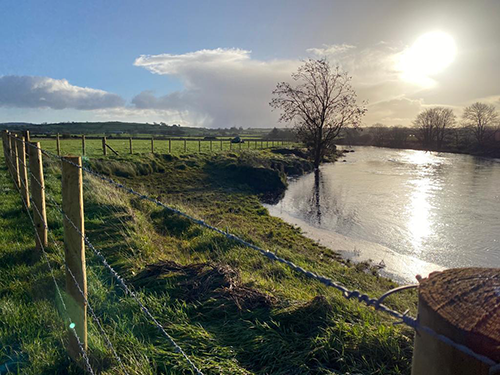The Rivers Trust
Helped to reduce pesticide concentrations in rivers in Ireland and Northern Ireland
Northern Ireland Water and Uisce Éireann, formerly known as Irish Water, often struggle to treat water abstracted from rivers and lakes due to their levels of pollution. Farmers there use a herbicide to control the growth of rushes in fields and livestock faeces finds its way into the rivers. Removing the chemicals from drinking water requires the use of other chemicals and produces high levels of sludge, which ultimately impacts wildlife.
 The Rivers Trust partnered with Uisce Éireann, the Agri-Food and Biosciences Institute, East Border Region and Ulster University to develop a strategy to reduce pollution and improve water quality in the River Erne and River Derg catchment areas.
The Rivers Trust partnered with Uisce Éireann, the Agri-Food and Biosciences Institute, East Border Region and Ulster University to develop a strategy to reduce pollution and improve water quality in the River Erne and River Derg catchment areas.
In 2017, NI Water obtained a €4.9m grant from the EU and the UK to run a five-year project that aimed to empower communities, educate farmers on practical measures to make land management sustainable and protect water, and teach children the importance of the water journey.
By 2022, on-farm water protection measures had been implemented on 118 farms in the River Derg catchment, which led to a 24% fall in herbicide concentration and a 40% reduction in total load. Some 43 volunteers in the Erne and Derg catchment were trained to become citizen scientists, acquiring new skills and equipment, and 1,947 children learned where their water comes from and the importance of good, clean and safe drinking water.
Another notable achievement was the collection of 488 containers and 925 litres of herbicides, sheep dip chemicals, insecticides, fungicides, veterinary medicines and rodenticides from 24 farmers in the River Derg catchment, which reduced the risk of these getting into the water.
It is estimated that for every £1 invested through the Source to Tap Project, there will be £3.36 worth of benefits over 30 years through reduced water treatment costs and improved catchment ecosystem services.
Awards judges Chris Sherwood and Karin Woodley were impressed by the cross-border collaboration in the Rivers Trust’s project. Sherwood said: “It involved lots of partnership working, and they’ve got really good outcomes; they’re able to demonstrate that they’ve cleaned up those rivers and reduced the chemicals in the water.”
Kris Murali said the project had made a real difference and the education aspect meant it should be sustainable.
CC Reg no. 1107144
